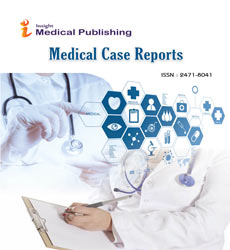Liver Injury: Understanding the Causes, Symptoms, and Treatment Options
Robert Percarpio
Department of Gastroenterology and Hepatology, Nepean Hospital, Kingswood, Australia
Published Date: 2023-06-09DOI10.36648/2471-8041.9.6.310.
Robert Percarpio*
Department of Gastroenterology and Hepatology, Nepean Hospital, Kingswood, Australia
- *Corresponding Author:
- Robert Percarpio
Department of Gastroenterology and Hepatology,
Nepean Hospital, Kingswood,
Australia,
E-mail: Percarpi_R@health.au
Received date: May 10, 2023, Manuscript No. IPMCRS-23-17494; Editor assigned date: May 12, 2023, Pre QC No. IPMCRS-23-17494 (PQ); Reviewed date: May 23, 2023, QC No. IPMCRS-23-17494; Revised date: June 02, 2023, Manuscript No. IPMCRS-23-17494 (R); Published date: June 09, 2023, DOI: 10.36648/2471-8041.9.6.310.
Citation: Percarpio R (2023) Liver Injury: Understanding the Causes, Symptoms, and Treatment Options. Med Case Rep Vol.9 No. 6:310.
Description
The liver, a vital organ responsible for numerous metabolic functions, is susceptible to various injuries and diseases. Liver injury refers to damage or dysfunction of the liver cells, which can lead to a range of health complications. Understanding the causes, recognizing the symptoms, and exploring the treatment options for liver injury are essential in effectively managing this condition. In this article, we delve into the intricacies of liver injury, shedding light on its causes, symptoms, diagnostic methods, and available treatments. Hepatitis viruses, such as hepatitis A, B, C, D, and E, can cause inflammation and damage to liver cells, leading to liver injury. Excessive and chronic alcohol consumption can result in alcoholic liver disease, causing inflammation, fatty deposits, and ultimately leading to liver injury. Non-Alcoholic Fatty NAFLD is characterized by the accumulation of fat in the liver, which can progress to inflammation and liver injury. It is often associated with obesity, insulin resistance, and metabolic syndrome. Certain medications, such as acetaminophen (paracetamol), nonsteroidal anti-inflammatory drugs (NSAIDs), and some antibiotics, can cause liver injury when used in excessive doses or in individuals with underlying liver conditions. Additionally, exposure to toxins, such as certain chemicals and industrial pollutants, can also lead to liver injury. Autoimmune hepatitis, a condition in which the immune system attacks liver cells, can cause inflammation and progressive liver injury if left untreated. The symptoms of liver injury can vary depending on the underlying cause and the severity of the condition. Diagnosing liver injury involves a comprehensive evaluation of medical history, physical examination, and laboratory tests. Blood tests can assess liver function, measure specific enzymes and proteins, and detect markers of liver inflammation. Imaging studies, such as ultrasound, CT scan, or MRI, may be used to assess the liver's structure and identify any abnormalities. The treatment of liver injury depends on the underlying cause and the extent of liver damage. In some cases, lifestyle modifications may be sufficient to manage liver injury, such as abstaining from alcohol, maintaining a healthy weight, and adopting a balanced diet. Medications and interventions may be prescribed to address specific causes of liver injury, such as antiviral medications for viral hepatitis or immunosuppressive drugs for autoimmune hepatitis. For severe cases of liver injury or advanced liver diseases, a liver transplant may be necessary. A liver transplant involves surgically replacing the damaged liver with a healthy liver from a deceased or living donor.
Autoimmune Conditions
Liver injury encompasses a range of conditions that can result in damage to liver cells and impaired liver function. Understanding the causes, recognizing the symptoms, and seeking timely medical intervention are crucial in managing liver injury effectively. By adopting preventive measures and maintaining a healthy lifestyle, individuals can reduce their risk of liver injury and promote optimal liver health. The liver is a vital organ responsible for performing essential functions in the body, including detoxification, metabolism, and bile production. Liver injury refers to damage or impairment of liver function, which can result from various causes, including infections, toxins, medications, alcohol, autoimmune conditions, and underlying liver diseases. In this article, we explore the causes, symptoms, diagnosis, and treatment options for liver injury.
Antiviral Medications
Hepatitis viruses, such as hepatitis A, B, and C, can cause inflammation and damage to liver cells, leading to liver injury. Excessive alcohol consumption can lead to alcoholic hepatitis or alcoholic fatty liver disease, which can progress to more severe conditions like alcoholic cirrhosis. Certain medications, herbal supplements, and toxins can cause Drug-Induced Liver Injury (DILI), resulting in liver damage. Examples include acetaminophen (paracetamol) overdose, Nonsteroidal Anti- Inflammatory Drugs (NSAIDs), and certain antibiotics. Autoimmune hepatitis and primary biliary cholangitis are autoimmune disorders where the immune system mistakenly attacks liver cells, causing inflammation and injury. Conditions such as non-alcoholic fatty liver disease (NAFLD) and Non- Alcoholic Steatohepatitis (NASH) can cause liver injury due to the accumulation of fat in the liver. To diagnose liver injury, healthcare professionals may perform a comprehensive evaluation, including medical history, physical examination, blood tests to assess liver function and detect specific markers of liver injury (such as liver enzymes and bilirubin levels), imaging studies (ultrasound, CT scan, or MRI), and in some cases, liver biopsy to evaluate the extent of liver damage and determine the underlying cause. The management of liver injury depends on the underlying cause and the severity of liver damage. If liver injury is due to a specific infection, medication, or toxin, discontinuing or treating the cause may help improve liver function and facilitate recovery. For liver injury associated with alcohol abuse or metabolic disorders, lifestyle changes such as alcohol cessation, weight loss, and a healthy diet are essential to prevent further liver damage. In certain cases, medications may be prescribed to alleviate symptoms, reduce inflammation, or manage underlying liver diseases. For example, antiviral medications can be used to treat viral hepatitis, while immunosuppressive drugs may be employed in autoimmune hepatitis. Supportive measures aim to provide relief from symptoms and maintain overall health. These may include adequate nutrition, hydration, management of complications, and close monitoring of liver function. In advanced cases of liver injury, where significant liver damage has occurred, a liver transplant may be necessary to restore normal liver function. Liver injury encompasses a range of conditions that can result in damage and dysfunction of the liver. Understanding the underlying causes, recognizing the symptoms, and obtaining a prompt diagnosis are crucial for appropriate management. With the right interventions, including addressing the cause, making lifestyle modifications, and using targeted medications when necessary, liver injury can be managed effectively, allowing for improved liver function and overall health. Early intervention and ongoing monitoring are key to preventing complications and promoting liver regeneration.

Open Access Journals
- Aquaculture & Veterinary Science
- Chemistry & Chemical Sciences
- Clinical Sciences
- Engineering
- General Science
- Genetics & Molecular Biology
- Health Care & Nursing
- Immunology & Microbiology
- Materials Science
- Mathematics & Physics
- Medical Sciences
- Neurology & Psychiatry
- Oncology & Cancer Science
- Pharmaceutical Sciences
